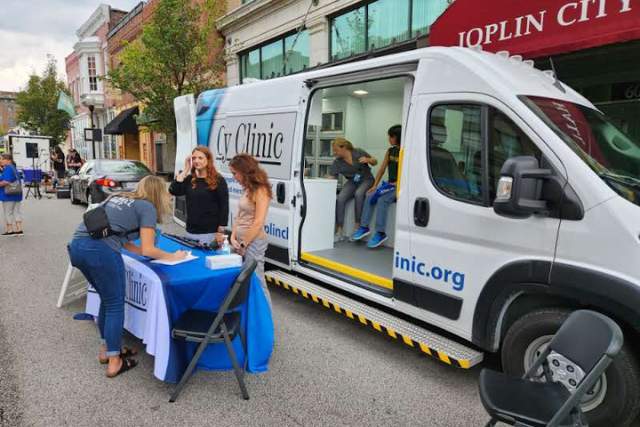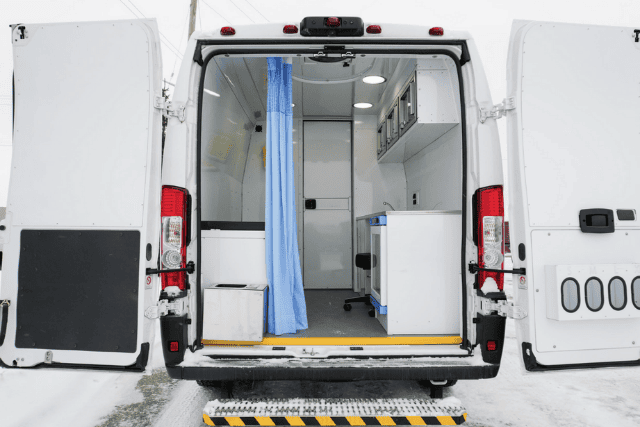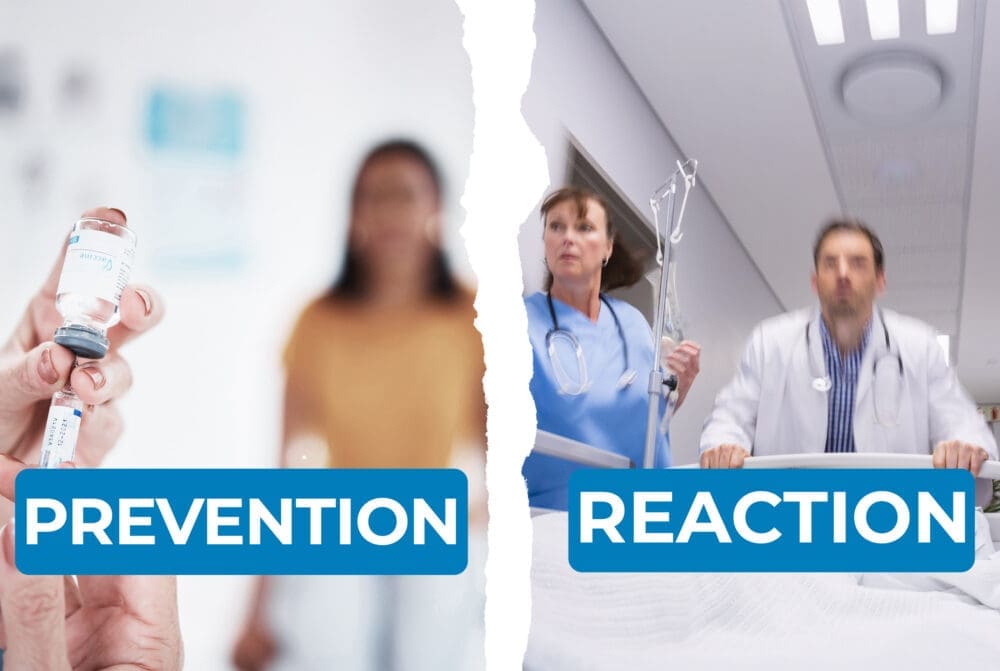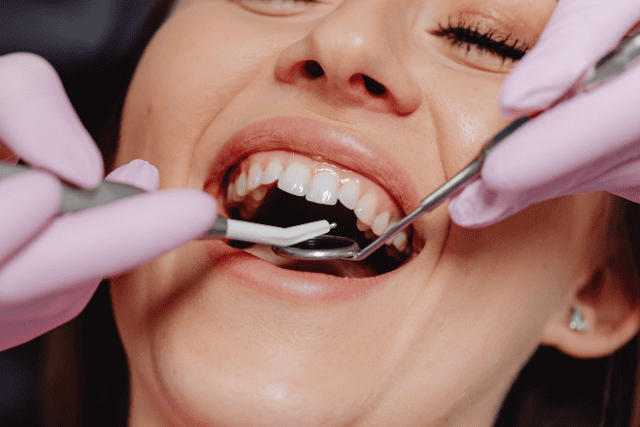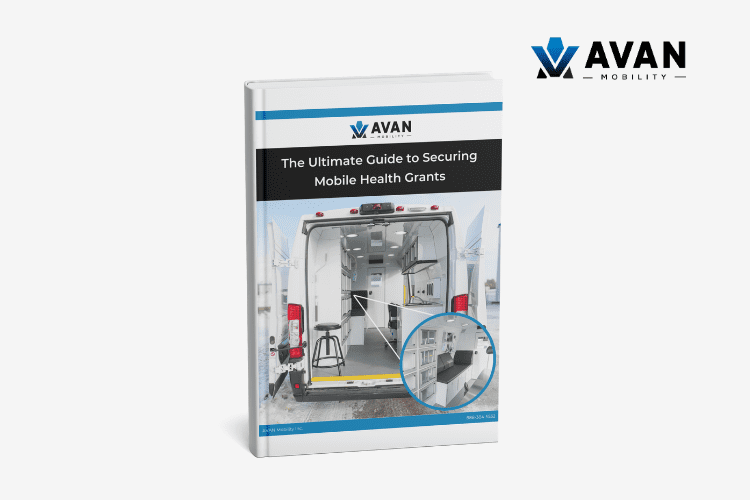Organizations all over the U.S. have started and are starting mobile medical clinics to break barriers to healthcare. Some of the barriers preventing people from getting healthcare include:
- Limited access to healthcare facilities
- Affordability issues
- Lack of understanding of healthcare services
- Cultural/language barriers
- Social stigma around health conditions
At AVAN Mobility, we manufacture specialized vans because we want everyone to have equal access to healthcare. Organizations around the U.S. rely on our vans to help break barriers to accessing healthcare so people can get the support they need.
We manufacture 4 different types of mobile medical vans that you can use for different purposes to help achieve this objective. We’ve been in the industry for over ten years and have manufactured hundreds of life-saving mobile medical units.
In this article, you’ll learn all about how mobile medical clinics break barriers to healthcare. After you’re done reading, you’ll have a clearer idea of how your organization can use a mobile medical clinic to reach more people facing such barriers.
How mobile medical clinics break barriers to healthcare
There are many barriers to healthcare people in the U.S. face. Keep reading to learn what they are and how mobile medical clinics help break them.
1. Overcoming distance barriers and bringing healthcare closer
Barrier: Some people in isolated and remote places or areas with few resources find it hard to reach hospitals. Long distances or scarce transportation options make it tough to get medical help. This means missed appointments and health issues getting worse.
How mobile clinics help: Mobile clinics bring healthcare to these communities and overcome the distance barrier. Think about Megan, who lives in a tiny mountain Appalachian town where getting to a hospital means hours on the road.
She needs regular diabetes check-ups, but getting to the city is a challenge because of her mobility issues and lack of transport. With the mobile clinic coming by every two weeks, Megan gets the care she needs without the long trip. This easy access means she stays healthy, managing her condition well, and feeling better overall.
Mobile medical clinics can also offer other check-ups, shots, and tests to other people in the community facing the same barriers.
2. Financial barriers to healthcare
Barrier: Sometimes, folks skip medical care because they can’t afford it. Healthcare costs, like doctor visits and medicine, can be too pricey, especially for those without insurance or with little money.
How mobile clinics help: Many non-profit mobile clinics offer healthcare at low prices or for free. This means folks who can’t pay much or don’t have insurance can still get the care they need without worrying about big bills.
Take Joanne, for example, who lost her job and health insurance due to the pandemic. She’s been having headaches but hasn’t seen a doctor because of the cost. Then, a mobile clinic comes to her neighborhood. Joanne finds out she can get check-ups and medicine for free.
The clinic determined that her headaches were migraines and gave her meds at no cost. Thanks to the clinic’s help, Joanne can handle her headaches without stressing about money.
You should also look at the video below of one of our past clients who purchased a Mobile Clinic Van from us to break financial barriers to healthcare and support the uninsured.
3. Breaking language and communication barriers
Barrier: Certain people around the U.S. struggle to talk to doctors because of language differences. Barriers to effective communication in healthcare can lead to misunderstandings and not getting the right treatment.
How mobile clinics help: Your mobile clinic can have staff who speak different languages and can translate. This means everyone can communicate well with their healthcare provider, no matter what language they speak.
For example, meet Juan, who moved to the U.S. recently and doesn’t speak much English. He’s been having chest pains but doesn’t know how to explain it to a doctor. Then, a mobile clinic comes to his neighborhood with Spanish-speaking staff.
With their help, Juan can describe his symptoms, get the right diagnosis, and start treatment. Thanks to the clinic’s language translation assistance, Juan gets the care he needs without any misunderstandings.
4. Time constraints
Barrier: Life gets busy, and long waits at the doctor’s office can make it hard to find time for appointments. People end up putting off getting help because they’re juggling work, family, and other stuff.
How mobile clinics help: Mobile clinics make it easy to get healthcare when it fits into people’s schedules. They have flexible appointment times and shorter waits, so people can see a doctor without spending all day waiting around.
Let’s take Lisa, a mom with a packed schedule. She’s been dealing with back pain but can’t find time to see a doctor. Then, a mobile clinic shows up in her work parking lot during lunchtime. Lisa hops in for a quick check-up without missing a beat. With short waits and easy access, she can take care of her health without adding more stress to her day.
5. Knowledge barriers
Barrier: A lot of people don’t know enough about their health or how to stay healthy. This can lead to problems because they don’t understand what’s going on with their bodies or how to prevent sickness.
How mobile clinics help: Mobile clinics teach people about their health and how to take care of themselves. They provide information through talks, handouts, and one-on-one chats so everyone can learn how to stay well.
For instance, Mark found out he has high blood pressure but isn’t sure what to do about it. Then, a mobile clinic comes to his isolated town tucked away in Arizona. Mark goes to a session where they talk about managing blood pressure by eating right and staying active.
With the clinic’s help, Mark learns how to take charge of his health and makes changes that keep him feeling good and his blood pressure under control.
6. Breaking stigma barriers
Barrier: In some situations, people avoid getting medical help because they’re worried about being judged. This can happen with things like drug and alcohol abuse. Individuals feel scared to talk about these things and might keep their problems to themselves.
How mobile clinics help: When people visit a mobile clinic, it’s all strictly confidential. It’s much different than a traditional brick-and-mortar clinic where there might be ten other people in the waiting room looking around. In a mobile medical clinic, the healthcare team makes sure everyone feels safe and comfortable talking about their health concerns without worrying about being judged.
Let’s look at a hypothetical example of Alex, who’s nervous about getting help for drug abuse because of the stigma around it. But when a mobile clinic comes to his college, Alex decides to seek assistance without giving his name.
The clinic promises to keep his information private and supports him every step of the way. With the clinic’s help, Alex feels at ease talking about his worries and gets the support he needs to take care of his drug problems.
7. Breaking cultural barriers to healthcare
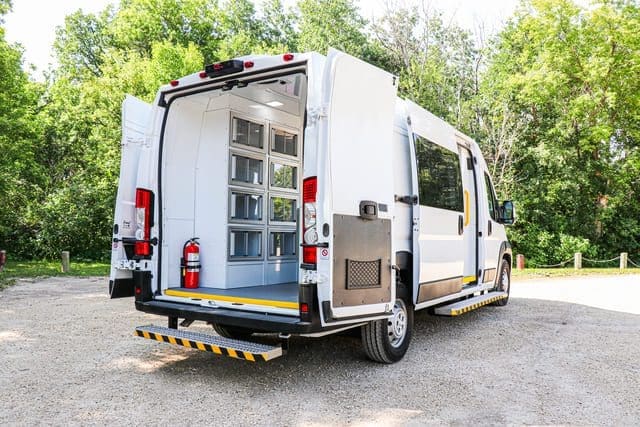
Barrier: People from different backgrounds feel left out of healthcare because their culture isn’t understood. Healthcare providers might not understand their beliefs or practices. Barriers to healthcare for immigrants can make it hard for people to trust the medical system and seek help.
How mobile clinics help: Mobile clinics can hire staff from diverse backgrounds who understand and respect different cultures. They can offer care that fits with people’s cultural beliefs and practices. This proactive measure can make sure everyone feels welcome and understood.
Let’s look at an example of Fatima, a refugee who’s new to the U.S. She needs medical help but feels unsure about going to a regular clinic because of language and cultural differences. One day, a mobile clinic with staff who speak her language and understand her culture comes to her community center.
With their help, Fatima feels comfortable getting the care she needs. They respect her beliefs and ways of doing things. This makes her feel valued and cared for. Thanks to the clinic’s understanding, Fatima feels more confident about seeking healthcare in the future.
8. Breaking social barriers to healthcare with mobile medical clinics
Barrier: Many people in the U.S. don’t trust the healthcare system. They worry about being treated unfairly or discriminated against because of who they are, where they live, what they do, or their background. This makes them hesitant to get medical help.
How mobile clinics help: Mobile clinics can work with local leaders and groups to earn trust in communities. They involve people in healthcare decisions and initiatives, making sure everyone feels heard and respected.
Think about a neighborhood where people have had bad experiences with healthcare in the past. But when a mobile clinic partners with local leaders and hosts health events in the area, things start to change for the better. As the clinic keeps reaching out and involving the community, trust grows. People feel more comfortable getting healthcare without worrying about being treated unfairly.
9. Overcoming psychological barriers and supporting emotional well-being
Barrier: Some folks feel embarrassed or scared to talk about mental health issues. They worry others might judge them, so they keep their feelings to themselves.
How mobile clinics help: Your organization can use a mobile clinic to offer private counseling and screenings for mental health. They create a safe space where people can talk openly about their feelings without fear of being judged.
Let’s look at an example of David, who’s been feeling anxious but doesn’t know how to talk about it. He went to a support group once, and someone laughed at him after he shared his story. From that point forward, he never went back to it.
Years after that, he saw a mobile clinic come to his neighborhood that offers mental health screenings. David decides to give it a try without giving his name. The clinic’s counselors listen to him without judging him and give him tips to manage his anxiety. With their support, David feels better knowing he’s not alone and can get help without feeling ashamed.
10. Mobility barriers
Barrier: It’s tough for some people to get to the doctor because they can’t move around easily. Mobility issues can be caused by age, disease, or disability, which can make getting to a clinic or hospital especially difficult.
How mobile clinics help: Mobile clinics solve this problem by bringing healthcare directly to those who have these mobility issues. A mobile clinic is versatile and can be set up in different neighborhoods and community centers to make accessing them easy.
Consider one last example of Emily, who is elderly and has trouble walking due to arthritis. She needs medical attention but finds it hard to get to the nearest clinic, that’s 15 miles away. One day, she noticed a mobile clinic parking near her apartment building.
Emily can now easily get the care she needs without worrying about transportation. With the mobile clinic’s help, she gets examined and manages her medication comfortably and successfully overcomes one of the barriers to healthcare for the elderly.
Start breaking healthcare barriers with AVAN Mobility
You found this article while researching mobile medical clinics. If you’ve made it this far, you’re now aware of some of the most common barriers to healthcare. You also now know how mobile medical clinics overcome barriers to healthcare.
As you can see, mobile medical clinics play a huge role in breaking down barriers to healthcare access all over the U.S. Organizations like yours can use mobile clinics to deliver convenient, inclusive, and compassionate care to people who need it the most.
Our company is a leading provider of innovative Mobile Clinic Vans, and we remain committed to manufacturing these vehicles to save lives and increase health equity. To start breaking barriers, providing healthcare, and saving lives, click the button at the end of this article to discuss how a mobile medical van can be customized to support your specific program.
Or, if you’d like more information on mobile medical clinics, you should check out our article on how to start one.
Another helpful article to steer your organization in the right direction is our guide on securing grants for one of these clinics.
Finally, you’ll also benefit from knowing about the cost of a mobile medical van so you’ll have a better idea if it’ll fit in your organization’s budget.
